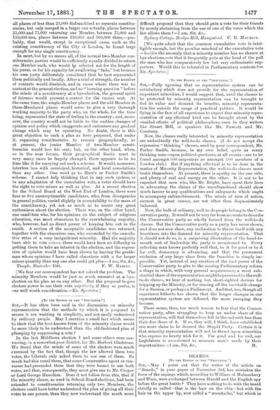fTo THE EDITOR OF THE "SPECTATOR. "]
Sia,—Fully agreeing that no representative system can be satisfactory which does not provide for the representation of important minorities, I would suggest that, until the classes to be protected by minority representation can be brought to feel its value and demand its benefits, minority representa- tion lies outside the range of practical politics. It would be flying in the face of all experience to expect that minority repre- sentation of any effectual kind can be brought about by the unaided efforts of political philosophers, even be they writers like Stuart Mill, or speakers like Mr. Fawcett and Mr. Courtney.
Now, the classes really interested in minority representsition are undoubtedly the well-to-do classes. (I do not accept the expression " thinking " classes, used by your correspondent, Mr. Parker Smith, because, in my own belief, quite as many thinking men—upon political questions, at all events—are to be found amongst 500 carpenters as amongst 500 members of a London club.) Bat if anything effectual is to be done in the matter of Minority Representation, the well-to-do classes must bestir themselves. At present, there is apathy on the one side, and plenty of zeal and energy on the other. It is not to be expected that men who, like Mr. Bright, have spent their lives in advocating the claims of the unenfranchised should show much favour to any qualifications and safeguards which ought to accompany enfranchisement. The minds of men of action, earnest in great causes, are not often thus dispassionately balanced.
Now, the bulk of ordinary, well-to do people belong to the Con- servative party, It would not be very far from accurate to describe the Conservative party as wholly formed from the well-to-do classes. But the Conservative party as a party has never shown, and does not now show, any inclination to throw itself with any heartiness into the demand for minority representation. That it should not do so, is a surprising illustration of the hand-to- mouth sort of leadership the party is accustomed to. Every reflecting man knows perfectly well that, be it for good or be it for evil, democracy is advancing, and that the permanent exclusion of any largo class from the franchise is simply im- possible. Yet, instead of any exertion of the vast power of the Conservative party to give to the coming Parliamentary reform a shape in which, with very general acquiescence, a most sub- stantial share of the representation might be preserved to the well- to-do classes, we hear of nothing but short-sighted devices for tripping up the Ministry, or for staving off the inevitable change for a Session, or perhaps a Parliament. And that, too, though all experience hitherto has shown that the longer changes in our representative system are deferred, the more sweeping they become.
There seems, then, too much reason to fear that the Conser. vative party, after struggling to keep an undue share of the representation, will find themselves left in the end with less than their due share of it. If so, they will, I think, have established one more claim to be deemed the Stupid Party. Certain it is
that minority representation will not be thrust upon minorities who express no hearty wish for it. For good and for evil, our Legislature is accustomed to measure men's needs by their


































 Previous page
Previous page